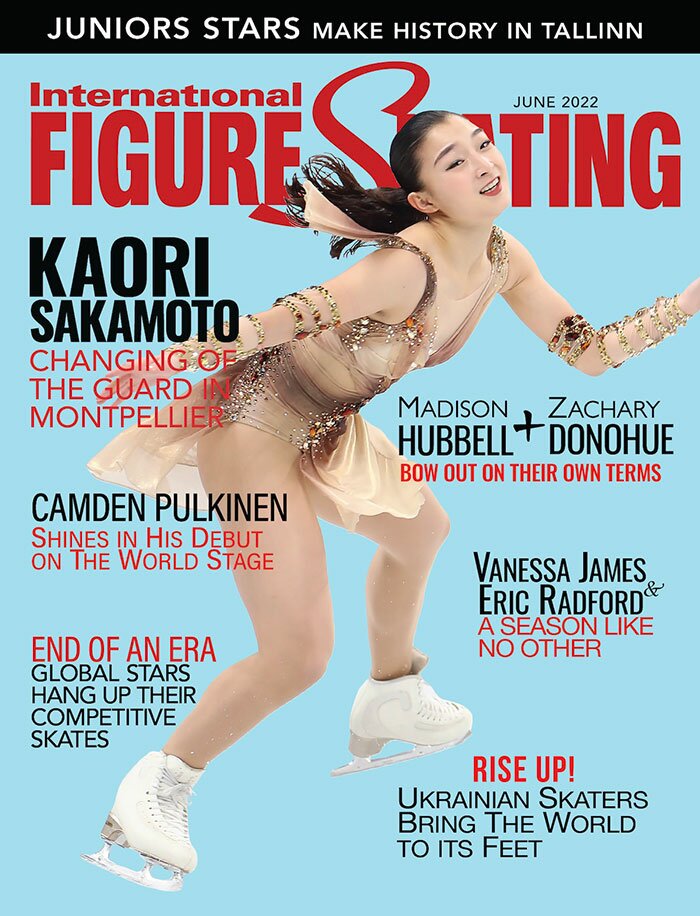

As Brian Joubert walked away from the Ice Palace in Sochi, Russia, following a 13th-place finish at the 2014 Olympic Winter Games, he declared that it was his final competitive outing. A few months later, however, he began flirting with the notion of becoming a pairs skater and started practicing moves with Daria Popova. In July, he went to Russia to try out with Katarina Gerboldt, who was then coached by Oleg Vasiliev.
Vasiliev subsequently announced that Joubert and Gerboldt had formed a partnership that would represent Russia. Joubert denied the claim and, a few months later, officially retired from the amateur ranks. “I believed that it was time for me to move onto new things,” the 2007 World champion explained. “All good things come to an end, and I knew that I would have to step away one day.”
Joubert kicked off his professional career with a third-place finish on the French version of “Dancing with the Stars.”
“Being part of that show was a learning experience for me, as it was very different from what I usually do on the ice,” the 31-year-old said. “I have to say that being a figure skater definitely helped me pick up the dance moves and learn the choreographies.”
He has spent much of the past year touring the world with Evgeni Plushenko’s on-ice theatrical production, “The Snow King,” in which Joubert plays a number of roles. “Skating in this show has been an extraordinary adventure so far,” he said. “I have also performed in several shows in Japan this year. The Japanese people are both welcoming and professional to work with. It is a country that I adore and definitely a place where I feel at home.
“While I have always loved competing and I still do, I have learned that competing and performing are two widely different things. The goals you are looking to reach are not the same. Preparing for a competition requires an enormous amount of work in order to deliver high-quality performances throughout a season, but preparing for a show enables you a greater amount of freedom on the ice when it comes to being creative and performing the choreographies.
“I would say preparing for competitions is about hard work, long hours, constant program run throughs and continually improving one’s technique. Preparing for shows, on the other hand, is about letting go, skating freely and giving and receiving from the audience.”
Joubert still resides in his hometown of Poitiers, France, where he plans to open his own figure skating school in the near future. “This is the city where I grew up and first stepped onto the ice. I spent most of my competitive career training here,” said Joubert who has also transitioned into coaching and is now working with several young skaters at his home rink.
“I have enrolled in the French national figure skating coaching degree program and hope to successfully pass it soon,” he said. “Becoming a coach was an obvious step in my involvement in the sport. I have extended experience as a high-level athlete, and I hope to be able to pass that on to the next generation of French figure skaters.”
Joubert began coaching Romain Ponsart in August, but Ponsart terminated the working relationship in November following his poor showing at Trophée Éric Bompard. “I believed in him, otherwise I would not have invested 12,000 euros in his choreography and work in the U.S.,” Joubert said. “I know what it takes to get to the highest level.
“This new coaching career has brought numerous challenges for me. One would think that standing by the boards would make competitions easier, but it’s quite the opposite. I wish very strongly to be able follow and lead at least one of my skaters to the same level of success I experienced. It would be incredible to relive those moments as a coach.”
Joubert said he is enjoying the change of pace as a professional. “What I enjoy most about my competitive career being over is the fact that, for the first time in my life, I don’t feel like I’m running after time anymore. The biggest change in my everyday life has been the fact that I no longer lead the strict high-performance athlete life that I used to.
“I have to admit that I allow myself to take some breaks from time to time. However, I try to practice at least once a day in order to stay fit for the shows I perform in. I definitely could not stand giving up any kind of physical activity. I am at the rink three times a day, either to train myself or to coach young skaters.”
Joubert said the transition from competitor to performer was easier than he thought it would be, and he has moved on with no regrets. “Last season was very busy for me, which is also the reason the transition went smoothly. There was little time for me to think about it at all. There are always certain moments in life — or in a skater’s career — that one wishes to forget or to take back.
“Nevertheless, I have no regrets when it comes to the way my career unfolded. Looking back at the bigger picture, I am very satisfied and proud of it. I have to say that every single podium, whether it happened at a small competition or a big Championship, will forever be etched in my memory.”
RELATED CONTENT:
BRIAN JOUBERT LOVING LIFE BEHIND THE BOARDS



